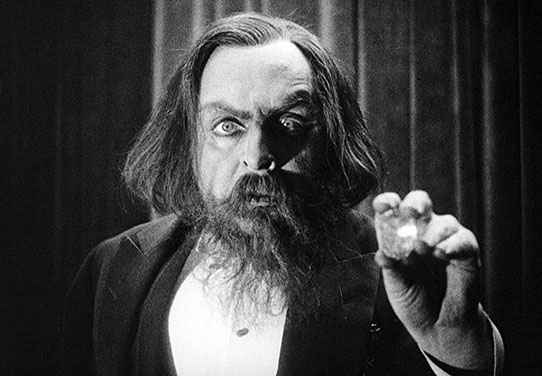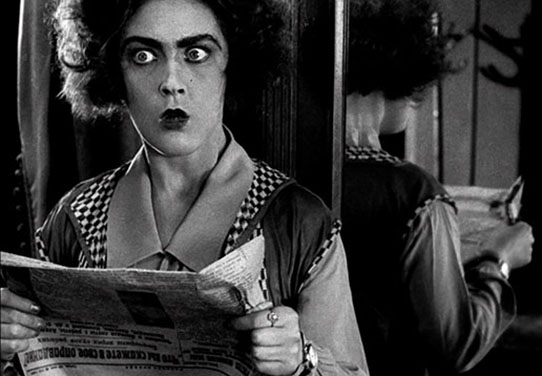Tomasz Kolankiewicz
Director of FINA
Dear participants of the Silent Movie Festival,
It is a great privilege to welcome you to the 20th anniversary edition of our festival. For years, the Silent Movie Festival (previously known as Warsaw Silent Film Days) has been a key event of the National Film Archive dedicated to promoting silent cinema and sharing knowledge about the work of film archives. Since 2017, following the merger of the National Film Archive and the National Audiovisual Institute (to form the National Film Archive Audiovisual Institute – FINA), organizing the festival has become an excellent platform for collaboration and fostering teamwork between members of both institutions. Throughout that challenging period, the festival was led by the late Anna Sienkiewicz-Rogowska, who served as director of the National Film Archive from 2015 and later as deputy director of FINA. She is honored as the festival’s matron this year. As a unique tribute and commemoration of Anna’s contribution, the festival has joined forces with Siostry Archeo Collective, which has been organizing the Sounds of Silents event over the past few years. It is my hope that this collaboration will clearly demonstrate that the era of divisions within FINA can be finally put behind us. I firmly believe that our joint efforts will prove highly productive and will deliver an even more impressive Silent Movie Festival this year.
At the heart of silent cinema festivals lies a fascinating paradox: cinema was never truly silent, as it was always accompanied by live commentary or music—sometimes even full symphonic orchestras. Thus, an event showcasing these "soundless" works today transforms into a grand musical (!) celebration. The presentation of often century-old cinematic works is typically done in two ways. This includes either the traditional way with live music performed from preserved scores using period instruments (or, when scores are unavailable, with newly composed soundtracks that reflect the musical trends and styles of the film’s premiere era), or by pairing the visuals with new, often experimental music performed by artists not typically involved in film scoring. During the festival, we have decided to follow the second path, hoping that it would open up the films to new audiences and help them connect with the modern world.
This year’s festival program, curated by our new artistic director, Elżbieta Wysocka-Koerber, is both very ambitious and deeply engaging for modern audiences. Amid the widespread discussions about artificial intelligence, in a world changing right before our eyes, but also facing a terrifying vision of resurging political extremism and an actual threat of war, it is worth reaching for the visions of the future spun by previous generations. These movies are sometimes shrugged off as relics or even entirely forgotten, yet they carry remarkably contemporary messages and highly perceptive social and political insights.
The Silent Movie Festival is ultimately a great tribute to the art and craft of filmmaking. This year, the festival's participants will have the opportunity to see original tapes by Kazimierz Prószyński presented with his original camera-projector "Oko". This is an event unique not only for the presented work itself, but also for the way of its presentation: an original 12cm-wide tape reproduced from a historical "Oko" camera model – with all of this happening not in a closed projection booth, but in front of the whole audience.
In addition, we will be presenting the little-known treasures of the interwar industrial cinema, key works of world cinematography, and other forgotten gems. Films, restored and digitally reconstructed, are screened from DCP or from unique 35mm and 8mm film prints. All accompanied by live music from the most excellent performers. The renaissance of classic cinema often overlooks its material aspect: how the film was made, on what medium, and how it was originally presented. How were the analog special effects created? How were the stunts filmed? How many meters of filmtape and what budget was there for these productions? How were they received during the premiere, and what was their later fate? And finally, perhaps the most interesting question: how did they reflect the reality of the time? What collective fears and desires are revealed in them, and do they still resonate today? Silent cinema is far more relevant to modern times than it might initially appear.
Elżbieta Wysocka-Koerber
Artistic Director of the 20th Silent Movie Festival
The Silent Movie Festival offers a space for open reflection on the history of cinema as well as its potential. We aim to broaden horizons, surprise, and inspire—knowing that our audience seeks not only aesthetic experiences but also meaningful themes and a more socially engaged cinema. The festival's program is addressed to all those fascinated with the language of images, whether they be enthusiasts of old or contemporary cinema. We invite those who have never watched a silent film on the big screen before, as well as those who think they have seen it all. Let yourself be surprised!
Apart from the absolute classics of cinema, we will show some of the lesser-known, underrated, or previously unseen in Poland, negotiating their place in the canon of world cinema. It is precisely them, thanks to their modern form and bold content, that gain new meaning and value. In this year’s festival, we reach for titles representing diverse and often freshly emerging movie genres: epic science fiction, action movies, horror, slapstick comediesy, documentaries, as well as industrial and advertising films. We craft these into multifaceted compositions inspired by early cinema programming: screenings of main titles preceded by often little-known short films, offering the viewer a fresh perspective on cinema beyond the scope of film history textbooks.
It will be a celebration of the film archive: together with outstanding guests, we will share with you the processes of preserving, restoring, and reconstructing the presented films. We will also demonstrate the evolution of the language of cinema, present pioneering uses of film technology, and unravel the making of special effects. We will draw you into the fascinating world of silent cinema through unique screenings both from digital media (premieres after remastering) as well as from 35mm, 8mm, and even 120mm prints film, presented in their original tinting and toning, preserving the full frame and projection speed in line with the time of the film’s creation and its character. The screenings will be accompanied by live music and other special events. Join us!
This year’s program is inspired by the 150th anniversary of the birth of Polish inventor Kazimierz Prószyński — a pioneer of film technology who designed devices for recording and projecting moving pictures, most notably the "Oko" camera. Prószyński, an underappreciated genius with a dramatic biography, becomes a symbolic figure in our reflection on our relationship with technology – on the fear of accumulation of technological power concentration and surveillance the issue of access control, but also the fascination that various innovations have practically always evoked. Technology shapes not only the world, but also our minds, our imagination, and our emotions.
It is best explained in the little-known example of early German expressionism titled Algol (1920, dir. Hans Werckmeister), which will open the main program. We are intrigued by the contemporary issue of replacing the dirty and heavy work in the mines with "clean" cosmic power. The movie resonates with what is currently referred to as technofeudalism in the context of criticism of contemporary digital capitalism, where monopolists control access to data and the tools we all use.
In our program, we will linger in the German cinema a while longer, immersing ourselves in the gloomy urban world of the movies by Fritz Lang. In Dr. Mabuse (1922), we follow the actions of a psychoanalyst who commits sophisticated crimes aided by his standing, hypnosis, and technological inventions. Another one of Lang's works presented in our program is the ultimate futuristic dystopia, Metropolis (1927). It tells a story of social conflict between workers and elites in a vertically designed machine-city. Technology is of political significance here, as a means to control the lower classes, yet it also plays a huge role in the film production process. Some details on the advanced special effects will be discussed before the screening by Tomasz Kolankiewicz, and you will be able to watch the movie in its longest, recently reconstructed version.
Not all movies, however, painted the future so grimly. In an era of uncertainty and transformation of the global order, some saw technology as a means of salvation. We shall thus also discuss the topics of pacifism, veganism, emancipation, and dreams of building a better and more just society in the context of the Trip to Mars (1918, dir. Holger-Madsen), the first full-length sci-fi film, and High Treason (1929, dir. Maurice Elvey), a British response to Metropolis produced towards the end of the silent film era. This film will provide a chronological capstone to this year’s festival.
Apart from these titles, the program will feature a series of companion shows and events. The family program, suitable for all ages, will be filled with robots, fantastical vehicles, experimental elixirsextraordinary potions, and, above all, daring inventors, including Charley Bowers, one of our festival’s greatest discoveries. Aren't you curious how to grow a tiny Ford Model T or how to create an ecological substitute for gasoline? You will find the answers in our previously unseen slapstick comedies on wild inventors/-ions.
Saturday afternoon will belong to Siostry Archeo and the Futurospekcja foundation. This year as well, Siostry Archeo, who for years have been searching for proto-feminist and socially engaged themes, will present movies that are striking in their surreal and avant-garde form and a very modern topic selection. They will be loosely connected to the festival's main theme by their references to power, unrest, and madness. As part of Sounds of Silents, you will be able to see two full-length movies: an unknown masterpiece of Georgian cinema from the Soviet era My Grandmother (1929, dir. Kote Mikaberidze), a satire on technocracy cult of efficiency full of freedom of imagery, as well as A Page of Madness (1926, dir. Teinosuke Kinugasa), an avant-garde horror film known as one of the most unique works of Japanese cinema. With its action taking place almost entirely in a psychiatric hospital, the movie impresses with innovative editing and optical experiments.
As part of one of the special events, our archivist Michał Pieńkowski will present the section A Light Take on the Heavy Industry of the Second Polish Republic, featuring pre-war industrial films. Additionally, we will showcase pre-war Polish advertisements inspired by the spirit of modernity. All of this coming from the FINA archive! Another incredible event will be the screening of the original 1914 "Oko" camera footage. This will be brought to you by Monika Supruniuk, a media archaeologist scientist who dedicated her doctoral dissertation to the life's work of Kazimierz Prószyński. Finally, on Sunday, the artistic duo kinoMANUAL will invite you to see the Planet Store performances and visit the cosmic chill zone open throughout the festival, with their media installations made from recycled optical toys, mutated analog projectors, and original prototypes, all accompanied by their own soundtrack.



